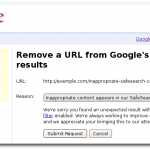News Organizations Side With Google In Fight Over ‘Right To Be Forgotten’
News Organizations Side With Google In Fight Over ‘Right To Be Forgotten’
by Wendy Davis @wendyndavis, (December 22, 2017)
A coalition of prominent news organizations are backing Google in its battle with European regulators over the scope of the so-called “right to be forgotten.”

“Any single state’s attempt to limit worldwide access to public information represents an existential threat to journalistic freedom and the fundamental rights of the people to receive information through any media,” the Reporters Committee for Freedom of the Press, along with The Associated Press, Dow Jones & Company, National Public Radio, The New York Times Company, and 20 other news organizations say in papers filed with Europe’s highest court.
The European Court of Justice is currently considering two cases dealing with the “right to be forgotten.” That right was created in 2014, when EU judges ruled that Google (and other search engines) must remove links to embarrassing information about Europeans at their request, after weighing their right to privacy against the public interest in the information. (The “right to be forgotten” doesn’t exist in the United States, where free speech principles protect the right to publish accurate information.)
Google has interpreted the right to be forgotten in Europe more narrowly than some government officials. The search company contends that the ruling only requires the removal of links to some material in European countries, like Google.fr, but not from its worldwide search results, including the U.S. page Google.com.
In 2015, French regulators rejected Google’s position and ordered the company to remove material from all of its results pages. Google recently asked Europe’s highest court to reject that view.
The Reporters Committee for Freedom of the Press and other news groups are backing Google’s request. “For the right of delisting to be applied reasonably and proportionately, its scope must be limited to domain extensions within the EU and EFTA (European Free Trade Association,” the groups write.
The groups point out that two years ago, the French authorities told Google to delete a link to a piece about a police chief accused of theft — even though he is a public official in the U.S.
If Google is required to purge that link from its search engines throughout the world, and not just in Europe, the deletion “might taint the efforts of a U.S. reporter,” the organizations write.
MediaPost.com: Search Marketing Daily
(27)












